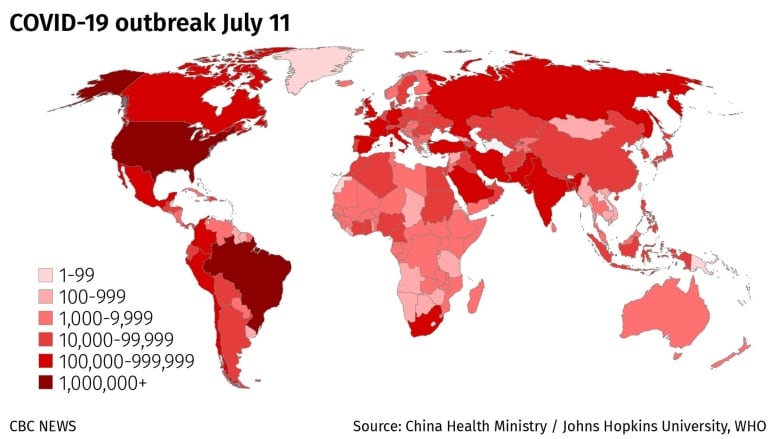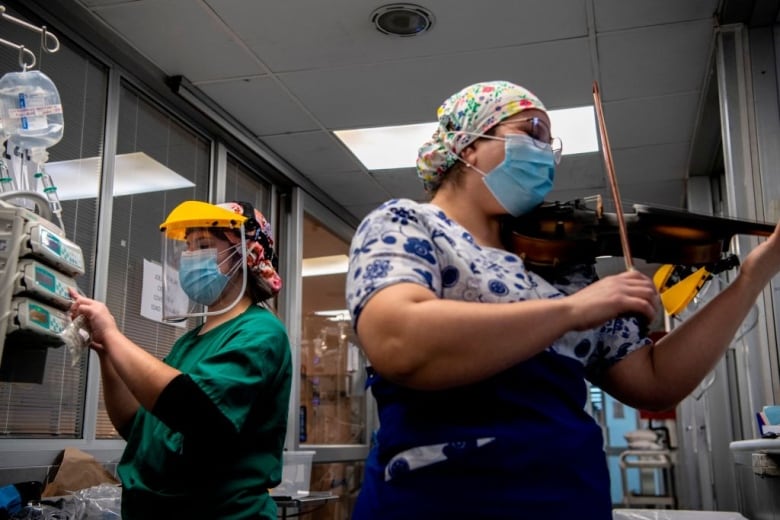Bill Gates calls for COVID-19 treatments, vaccines to go to people who need them, not ‘highest bidder’
Thomson Reuters · Posted: Jul 11, 2020
Billionaire philanthropist Bill Gates has called for COVID-19 drugs and an eventual vaccine to be made available to countries and people that need them most, not to the “highest bidder,” saying relying on market forces would prolong the deadly pandemic.
“If we just let drugs and vaccines go to the highest bidder, instead of to the people and the places where they are most needed, we’ll have a longer, more unjust, deadlier pandemic,” Gates, a founder of Microsoft, said in a video released on Saturday during a virtual COVID-19 conference organized by the International AIDS Society.
Drugs to treat COVID-19, and an eventual vaccine, should be distributed to countries and people based on need, Bill Gates said in a video released on Saturday during a virtual COVID-19 conference organized by the International AIDS Society. (Reuters)
“We need leaders to make these hard decisions about distributing based on equity, not just on market-driven factors.”
With hundreds of vaccine projects under way and governments in Europe and the United States investing billions of dollars in research, trials and manufacturing, there is concern that richer nations could scoop up promising medicines against the new coronavirus, leaving developing countries empty-handed.
The European Commission and the World Health Organization have warned of an unhealthy competition in the scramble for a medicine seen as key to saving lives and resolving economic chaos sowed by virus. Some officials in Washington have indicated they would seek to prioritize U.S residents.
Only aggressive action combined with “national unity and global solidarity” can turn the COVID-19 pandemic around, the head of the World Health Organization said after announcing the number of cases has more than doubled in the past six weeks.
A World Health Organization animal expert is part of a new mission to China to trace the coronavirus’s path from animal to people. 0:23
WHO director-general Tedros Adhanom Ghebreyesus was speaking Friday as the world recorded more than 12 million known cases of the respiratory illness, with more than 558,000 deaths. The UN agency also reported a record increase in cases for a single day of 228,102.
By early Saturday morning, the total confirmed cases around the world rose to 12,515,192, while 560,584 people have died of the disease, according to Johns Hopkins University in Baltimore. In the U.S. alone, there have been nearly 3.2 million cases, with 134,000 deaths.
Bars and clubs are beginning to reopen across the country. Dr. Lisa Barrett, an infectious disease specialist, explains things you can do to stay safe if you choose to go out. Thumbnail credit: Paul Chiasson/The Canadian Press 8:04
Infections have been reported in more than 210 countries and territories since the first cases were identified in China last December.
The WHO chief said it’s still possible to bring the outbreaks under control. He cited countries such as Italy, Spain and South Korea as examples of countries with success stories after sharp spikes in numbers.
India, meanwhile, has added more than 20,000 cases of coronavirus on a daily basis for a week now — but on Friday, that number rose to a record 27,114.
“This is a worrying development. And with the current trends, projections are that by the end of the coming week, India will have more than one million cases,” freelance reporter Neha Poonia told CBC News on Saturday.
With more than 820,000 cases, India is the third worst-hit country, after the U.S. and Brazil.
Jason Fraser, chair of the Ambulance Committee of Ontario for CUPE, is calling on the provincial government to make sure there is an adequate supply of personal protective equipment available for paramedics. 0:48
In sports, hockey became the latest sport to finalize a return during the pandemic after NHL owners and players approved an agreement on Friday to resume the season.
Games are scheduled to begin Aug. 1 in Toronto and Edmonton, Alta., with coronavirus cases in the U.S. pushing the league into Canada for the summer and fall until the Stanley Cup is awarded in late September or early October.
Training camps open across North America on Monday, which is also the deadline for players to opt out of participating with no penalty.
What’s happening with coronavirus in Canada
As of 7 a.m. ET on Saturday, Canada had 107,125 confirmed and presumptive coronavirus cases. Provinces and territories listed 70,901 of those as recovered or resolved. A CBC News tally of deaths based on provincial reports, regional health information and CBC’s reporting stood at 8,801.
Newfoundland and Labrador has reported its first new case of coronavirus in six weeks. The patient is a man in his 50s who had recently returned from the United States, according to the provincial health department.
The department says the man, who lives in the Eastern Health region, is self-isolating and did not travel through other Atlantic provinces.
Meanwhile, Nova Scotia has extended its state of emergency for another two weeks. Emergency measures are now in place until July 26.
The extension was announced as the province reported no new cases of COVID-19 and one more recovery — leaving only three active cases.
Some public health and infectious disease experts are pressing for governments in Canada to shift to minimizing, not eradicating, COVID-19 while allowing society to resume functioning.
The open letter to Prime Minister Justin Trudeau and all premiers, dated July 6, says aiming to prevent or contain every case is not sustainable at this stage in the pandemic.
“We need to accept that COVID-19 will be with us for some time and to find ways to deal with it,” the 18 experts wrote.
The aim of lockdowns and physical distancing was to flatten the epidemic curve so that health-care systems wouldn’t be overwhelmed with too many cases at once, said Neil Rau, an infectious disease physician and medical microbiologist at the University of Toronto. Stamping out the virus is a different goalpost.
Here’s what’s happening around the world
In Florida, the Disney World theme park was set to reopen in Orlando on Saturday, a day after the state reported its second-sharpest daily increase in cases.

A couple waits in line to enter Downtown Disney in Anaheim, Calif., on Thursday, the first day the outdoor shopping and dining complex has been open to the public since it closed in mid-March amid the COVID-19 pandemic. (Robyn Beck/AFP via Getty Images)
The park will open to a limited number of guests. Visitors and employees will have to wear masks and undergo temperature checks, and the resort will not hold parades, fireworks displays and other activities that draw crowds.
Florida recorded 11,433 new coronavirus cases on Friday, the state health department said.
Texas Gov. Greg Abbott says “things will get worse” in the state as more than 10,000 patients are now hospitalized with the COVID-19, the illness caused by the coronavirus. The deadliest week of the pandemic yet in Texas continued Friday with 95 deaths.
Texas members of Congress are asking the Trump administration to open a field hospital in the Rio Grande Valley.

Health-care workers move a patient in the COVID-19 unit at United Memorial Medical Center in Houston. (Mark Felix/AFP/Getty Images)
In Arizona, hospitals were at nearly 90 per cent capacity, with a record 3,437 patients hospitalized as of Wednesday, and a record number of those, 575, on ventilators, health officials said. Earlier in the week, a record high number of 871 patients filled intensive care beds.
Meanwhile, officials in Mississippi say the state’s five largest hospitals had no ICU beds available for patients by midweek because of a surge in cases. Four more hospitals had five per cent or less of ICU beds open.
In Chile, two regions in the south of the country will reopen starting Monday. Some cinemas, theatres, restaurants, and cafés will boot back up at about 25 per cent capacity.

However, it’s a different story in the capital Santiago. Strict quarantine measures will be in place for some weeks to come, including a daily curfew. Chile has about 310,000 known cases of coronavirus.
Chile currently ranks number six in the world for coronavirus cases, behind Peru, Russia, India, Brazil. The United States is the hardest hit.

Nurse Damaris Silva plays the violin for patients infected with COVID-19 at the intensive care unit of the El Pino hospital in Santiago, Chile, on Thursday. (Martin Bernetti/AFP via Getty Images)
South Africa’s confirmed coronavirus cases have doubled in two weeks to a quarter-million. Health Minister Zweli Mkhize has pleaded with South Africans to change their behaviour and help stop the spread.
Indonesia reported 1,671 new coronavirus cases on Saturday, bringing the total count to 74,018, Health Ministry official Achmad Yurianto told a televised news briefing. Fatalities from the virus rose by 66 on Saturday, bringing the total tally to 3,535, he said.





